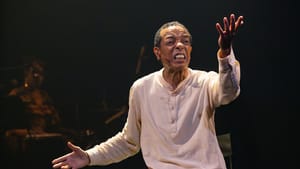Stay in the Loop
BSR publishes on a weekly schedule, with an email newsletter every Wednesday and Thursday morning. There’s no paywall, and subscribing is always free.
Channeling emotional ghosts
Philadelphia Theatre Company presents Roger Q. Mason’s The Duat

When we meet Cornelius Johnson (Neil), played by Frank X—the protagonist of Roger Q. Mason’s The Duat, now in its world premiere at Philadelphia Theatre Company—it is not at the beginning but the end. He stumbles, blindfolded, into a lit circle, alone but for the presence of an unspeaking drummer (Barbara “Muzikaldunk” Duncan). He is tasked, now, with recounting all that came before: a memory play that burrows deeper than Neil's initial façade, giving way to a history rife with self-hatred and insecurity. His life may be over, but his death is just beginning.
Directed by Taibi Magar, The Duat follows Neil in this liminal space as his heart is excavated and weighed on a scale. He will proceed to the next life only if its weight is equivalent to that of a feather; only by reconstructing the episodes of his life—the broken home, the bitter lovers, the time alternately spent with the Black Panther Party and the FBI—can he unburden his all-too-heavy heart. Unlike many a memory play, no phantoms join Neil on the stage. All these old ghosts are channeled through him and him alone. It’s a construction that at times leads to scenes of powerful emotionality, particularly for the work of X, whose performance falls somewhere between a plea and an exorcism. When you consider their weight together, however, you may find they add up to conspicuously less than the sum of their parts.
Seeking a rhythm
Much of this stems from the fact that, for a play that so centers the beat of the drum, it seems to constantly interrupt its own rhythm. Out of the gate, the direction is discontent to simply do one thing at a time, playing up Neil’s exasperation toward the Duat at the very instant of his discovery, launching into a banter between him and the drummer before their grammar has been fully established. The script also tends to gesture with too heavy a hand, especially in this opening sequence. Exposition on Egyptian mythology appears to have been cudgeled into Neil’s dialogue, to say nothing of attempts to thread in modern coinages. (A particularly tortured line bends over backward to inject a “Karen” reference into the mix, upon which my body receded into itself.)
The play begins to settle into a smoother rhythm, however, when Neil returns to his childhood: not the false image that he would have us believe, but the genuine article, the fundament of his pain. His father leaves at a young age (“for a white girl,” he brags, on his way out the door); his mother imparts her racial and sexual hangups to her son as if they were the stuff of DNA. It’s the first impact that ripples into his relationship with his high-school girlfriend (white, fetishizing), his insecurity among the other Black radicals in 1960s Los Angeles, and everything beyond.

If Mason’s script in these episodes can paint these relationships with too broad a brush, it’s balanced out entirely by the strength of X’s performance. It would be one thing if he had only delivered us the character of Neil, convulsing about the stage as a walking wound. That he also embodies the rest of the cast with dexterity and restraint elevates his work to something transcendent. He toggles between roles such that they are never caricatured, always distinct, alternately easy to love and hate. The lights, designed by Thom Weaver, are in these moments at their finest, rendering a complete time and place in a simple explosion of color. At times, it feels like a genuine magic trick: entire scenes unfold, and you almost forget it’s only X on the stage.
A hollow ending
Even amidst these flashes of brilliance, though, the play never quite overcomes its initial wobble, especially when we consider the endpoint of all these episodes. As one heartbreak piles on another, rendering a portrait in which regret is not a hint but a defining feature, the play makes clear that its mission is absolution, one which it will attain at any cost. We end, therefore, on an overwrought note of forgiveness: a “you-are-enough” that feels almost entirely disconnected from the character we’ve seen over the past 90 minutes. A tension is born, the aims of the play clashing with the emotional truth before us, but instead of sitting with this tension, the play bypasses it, sanding off the edges of much of the raw portrait that came before. It’s a kind of reverse deus ex machina, all the problems unsatisfactorily solved by transporting our protagonist to heaven from the earth.
In straining for catharsis, the play ends on its most hollow note, a broadly executed one-size-fits-all act of empathy that almost entirely sidesteps the nuances of Neil’s life and times. There are moments in this Duat that sharply resonate, but its construction, in the end, is so busy interrogating its protagonist that it never stops to interrogate itself.
What, When, Where
The Duat. By Roger Q. Mason, directed by Taibi Magar. $20-$73. Through Sunday, June 23, 2024, at the Suzanne Roberts Theatre, 480 S Broad Street, Philadelphia. (215) 985-0420 or philadelphiatheatrecompany.org.
Accessibility
The Suzanne Roberts Theatre is a wheelchair-accessible venue. Assisted listening devices are available for all performances.
There will be an audio-described performance of The Duat on Saturday, June 15, at 2pm, and an open caption performance on Saturday, June 22, at 2pm.
Sign up for our newsletter
All of the week's new articles, all in one place. Sign up for the free weekly BSR newsletters, and don't miss a conversation.
 Kiran Pandey
Kiran Pandey